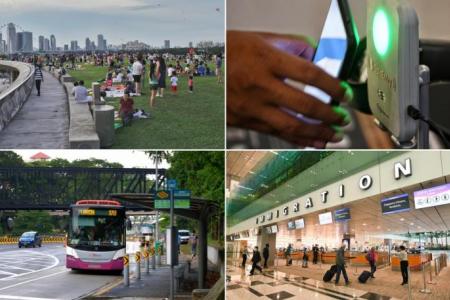All you need to know about Singapore's major easing of Covid-19 rules
Group size limits and safe distancing requirements will be removed, as part of a large-scale easing of Covid-19 measures announced on Friday (April 22).
The Disease Outbreak Response System Condition (Dorscon) level, which indicates the current disease situation, will also be lowered from orange to yellow from Tuesday.
Singapore has been at Dorscon orange since Feb 7, 2020.
This comes as daily infection numbers continue to fall and have stabilised, giving the Government the confidence to proceed with further easing of community and travel measures, said the Ministry of Health (MOH).
While cautioning that potential curve balls may knock Singapore back to square one, Health Minister Ong Ye Kung said during a multi-ministry task force press conference that "on the whole, things continue to look up for us".
"Our social resilience is strong and now we are in a comfortable position. We can therefore afford to take further steps to reinstall pre-Covid-19 normalcy," he said.
Here are the changes announced:
1. No more group size limits and no more requirement for safe distancing
From April 26, individuals will not need to keep to a group of 10 persons for mask-off activities.
The cap on the number of unique visitors to a household, previously 10 persons at any one time, will also be lifted.
This also applies to attendance limits for home marriage solemnisations and home funerals.
As group size limits are lifted, safe distancing will also no longer be required between individuals or between groups, both indoors and outdoors.
2. Mask wearing still required indoors
Mask-wearing will continue to be required in indoor settings when people leave their homes, including on public transport.
Mask-wearing will remain optional in outdoor settings. However, the Health Ministry encouraged individuals to exercise precaution. For example, in crowded outdoor areas, it would still be a good idea to wear masks, it said.
3. All workers may return to the workplace; masks can be removed in select situations
From April 26, all workers may return to the workplace, up from the current limit of 75 per cent of those who can work from home.
Notwithstanding the mask-on requirement in indoor settings, workers will be allowed to remove their masks at the workplace if they are not interacting physically with others and are not in customer-facing areas.
The Health Ministry encouraged employers to retain and promote flexible work arrangements, such as telecommuting and staggered work hours, as a permanent feature of the workplace.
4. Capacity limits removed for large events with more than 1,000 participants
Currently, larger settings or events with more than 1,000 participants and that require masks on are subject to a capacity limit of 75 per cent.
From April 26, this limit will be removed.
The only exceptions are nightlife businesses where dancing among patrons is one of the intended activities. These will continue to be subject to a 75 per cent capacity limit.
5. Pre-departure test before entry to Singapore no longer needed if fully vaccinated
From April 26, all fully vaccinated travellers and non-fully vaccinated children aged 12 and below arriving via air or sea checkpoints, will no longer be required to take a pre-departure test before departing for Singapore.
Currently, fully vaccinated travellers arriving via these checkpoints must take a test within two days of their departure for Singapore.
Entry requirements for non-fully vaccinated travellers remain unchanged.
All non-fully vaccinated travellers aged 13 and above who are allowed to enter Singapore are required to take a pre-departure test within two days before departure for Singapore, undergo a seven-day stay-home notice period, and take a polymerase chain reaction test for Covid-19 at the end of their stay-home notice period.
6. Vaccination-differentiated safe management measures removed in most settings; workforce vaccination measures lifted
Vaccination-differentiated safe management measures (VDS) will be removed from April 26 from most settings.
They will remain for events with more than 500 participants at any one time, such as larger-scale gala dinners, weddings, dinner and dance events; nightlife establishments where dancing among patrons is one of the intended activities; and food and beverage establishments, including restaurants, coffee shops and hawker centres.
But while VDS is still required at F&B establishments, these businesses will no longer need to conduct vaccination status checks on their customers. The onus will be on individuals to abide by the rules.
At the same time, workforce vaccination measures will also be lifted, nationally. The measures had required employers to ensure that those returning to the workplace are fully vaccinated.
Given that the pandemic is not yet over, tripartite partners have agreed that employers should have the flexibility to continue implementing vaccination-related instructions for employees for workplace health and safety and business continuity reasons, and in accordance with employment law, said the Health Ministry.
7. Step down in use of TraceTogether and SafeEntry
As most venues will also no longer require the public to check in using the TraceTogether app or token as part of vaccination-differentiated safe management measures, the use of TraceTogether and SafeEntry will cease.
However, these capabilities will be maintained as a means of conducting VDS checks where necessary, and also to enable the Government to rapidly step up contact tracing and checks should it need to do so again in response to any new variant of concern, said MOH.
The public is therefore strongly encouraged to keep the TraceTogether application on their phones as well as their TraceTogether tokens, it said.
Any generated TraceTogether or SafeEntry data may continue to be used by police officers and law enforcement officers for criminal investigations and proceedings in respect of serious offences, as provided for under the Covid (Temporary Measures) Act.
8. No more health risk notices
From April 26, MOH will stop issuing health risk notices to close contacts of Covid-19 positive cases.
Individuals infected with Covid-19 will no longer need to submit details of household contacts online, but should continue to exercise social responsibility.
They should inform their close contacts, who can take the necessary precautions and test themselves before leaving their homes, to prevent further spread, said MOH.
Settings with vulnerable persons, such as hospitals, nursing homes and elderly homes, should request proof of a negative Antigen Rapid Test (ART) result for persons with recent exposure before allowing them entry.
9. No more free community ART tests
The Government had previously provided free community ART testing and weekend acute respiratory infection testing at Combined Test Centres (CTCs) and Quick Test Centres (QTCs) during the Omicron wave to alleviate the workload at general practice clinics and other healthcare facilities.
With the declining case numbers and easing workload, these free tests will cease from April 26.
Paid ART testing will still be available for members of the public at the CTCs, QTCs, general practitioner clinics or via tele-ART providers.
10. Resumption of cross-border bus and taxi services to Malaysia
Following the reopening of Singapore and Malaysia land borders for fully vaccinated travellers on April 1, the Land Transport Authority, together with the public transport operators, will resume the operation of cross-border bus services from May 1.
Singapore bus operators will reinstate cross-border bus services between Singapore and Johor Baru. These include services 160, 170 and 170X operated by SBS Transit, service 950 operated by SMRT Buses, and services TS1, TS3, TS6 and TS8 operated by Transtar Travel.
Cross-border taxi operations will also resume from May 1.
Commuters travelling to Johor can either board a taxi at the Queen Street taxi terminal or book one through taxi companies with licensed cross-border taxi drivers.
11. Expansion of community visits for migrant workers
From April 26, up to 25,000 migrant workers will be able to visit the community on weekdays, and up to 50,000 on weekends and public holidays, for up to 8 hours per visit.
This is an increase from the current quotas of 15,000 on weekdays, and 30,000 on weekends and public holidays.
With the lifting of VDS in most settings, unvaccinated migrant workers will now also be allowed to participate in community visits.
12. Boosters available for those aged between 60 to 79
While the Expert Committee on Covid-19 is not recommending that seniors aged between 60 and 79 years receive a second booster shot, it has agreed to offer it to seniors who wish to have it.
They can get their shots by going to any vaccination centre offering mRNA vaccines, before 7pm.
The second booster vaccine dose should be administered about five months after receiving the first booster.
Earlier recommendations were for a second booster for specific groups - those aged 80 and above, residents of aged care facilities, and the medically vulnerable.
For those aged 12 and above who have recovered from Covid-19 and have completed their primary vaccination doses, they will need to have the booster dose within nine months of their last primary vaccination dose to maintain their vaccinated status.
This is in view of waning immunity and should not be delayed beyond nine months of the last primary vaccination dose.
These individuals can walk into any vaccination centre before 7pm to receive their booster dose.
Get The New Paper on your phone with the free TNP app. Download from the Apple App Store or Google Play Store now


